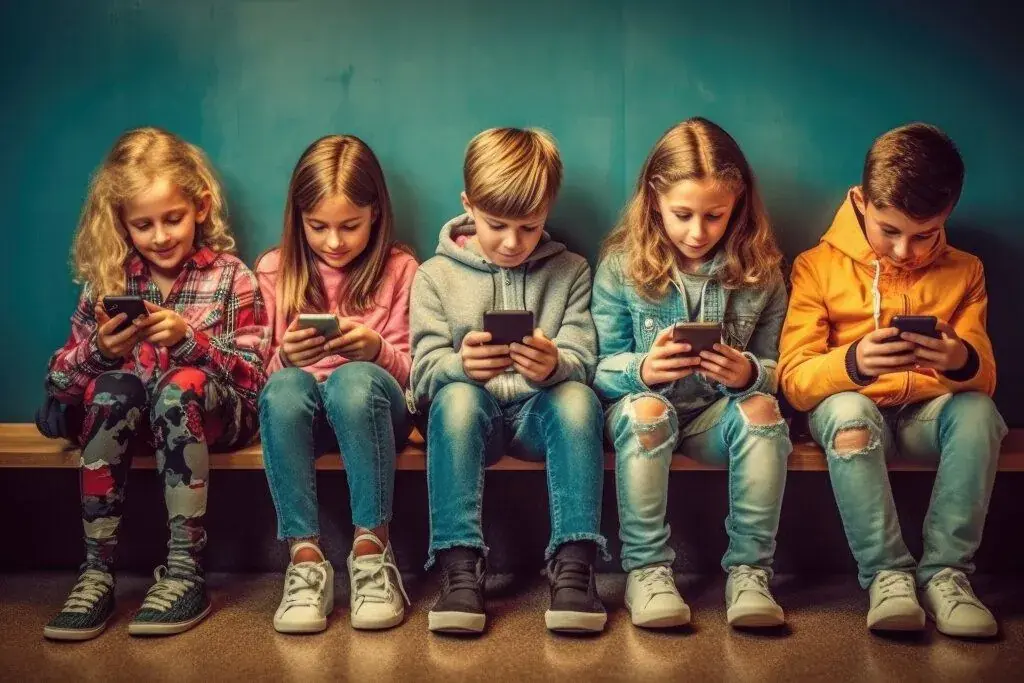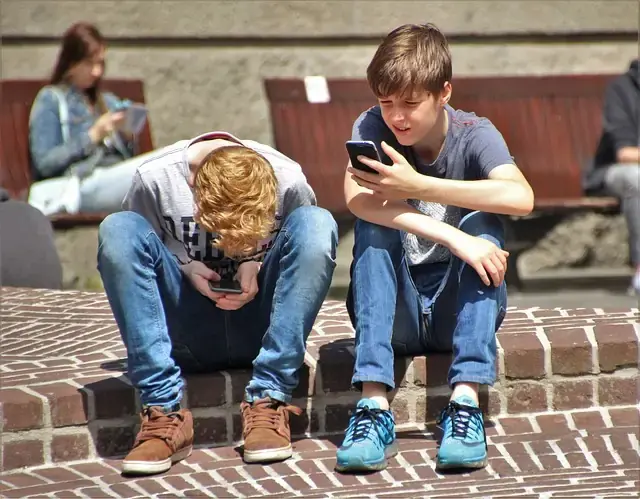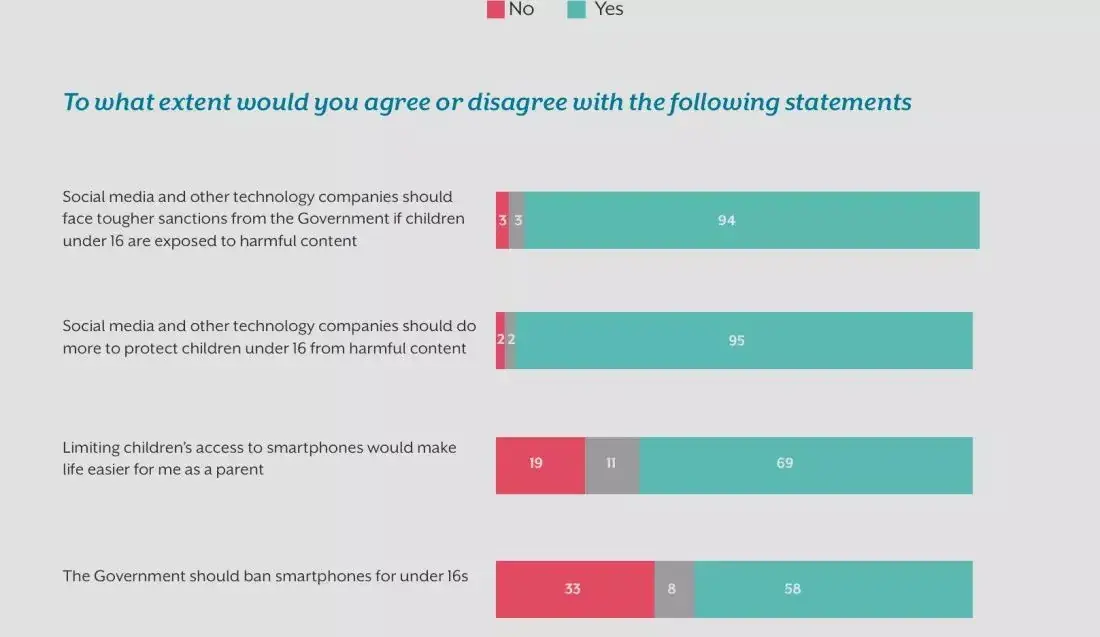To combat teenagers’ addiction to mobile phones, the UK government plans to introduce legislation that will regulate existing sales channels and ban the sale of smartphones to minors under the age of 16. This move has been met with widespread support from parents in the UK, who are increasingly concerned about the impact of smartphones on their children’s mental and physical health.

Parents’ Concerns
According to a recent survey of 2,496 parents of school-age children in England, 83% of parents believe that smartphones are harmful to children and young people. The survey also found that 58% of parents believe the government should introduce a ban on smartphones for under-16s, with even higher support among parents of primary school children (77%).
These concerns are not unfounded, as a recent poll commissioned by Parentkind found that 93% of parents think social media is harmful to children, and 95% of parents want social media giants and tech companies to do more to protect children from harmful content. The poll also found that 80% of parents believe the age limit for social media access, which is typically 13, is too low and should be raised.
Impact of Smartphones on Children’s Health
The impact of smartphones on children’s health is a growing concern for parents and experts alike. The Royal College of Paediatrics and Child Health has warned that excessive screen time can affect children’s physical and mental health, leading to issues such as obesity, sleep disturbances, and mental health problems.
In addition to the impact on physical and mental health, there are also concerns about the impact of smartphones on children’s social and emotional development. The constant availability of social media and messaging apps can lead to addiction and a lack of face-to-face social interaction, which can affect children’s ability to develop healthy social skills and relationships. Thus, many people want the government to ban the sale of smartphones to minors.
Government Guidance
In response to these concerns, the UK government has published guidance on the use of smartphones in British schools, which suggests that schools could do this by requiring students to leave their phones at home, turn them in when they arrive at school, store them in inaccessible lockers, or prohibit students from using their phones in classrooms or on campus.

The guidance also suggests that schools could use technology to monitor and manage students’ phone use, such as using software to block access to certain websites or apps during school hours. However, the use of such technology raises concerns about privacy and the potential for misuse.
The UK government believes that banning the sale of smartphones to under-16s can further protect children from the potential dangers of social media and other online threats such as crime, cyberbullying, pornography and hacking.
A recent survey of 2,496 parents of school-age children in England found that 58% believed the government should ban smartphones for children under 16. Below is a screenshot of the survey report

The survey also showed that four out of five parents believe smartphones are harmful to children and teenagers. Another survey found that 64% of people think banning the sale of mobile phones to children under 16 is a good idea. Only 20% thought it was a bad idea.
Industry Response
The tech industry has also responded to concerns about the impact of smartphones on children’s health. Apple, for example, has introduced features such as Screen Time, which allows parents to set limits on their children’s phone use and monitor their activity. Google has also introduced similar features for Android devices, such as Digital Wellbeing.
However, these features are not a substitute for parental involvement and guidance. Parents still need to be aware of their children’s phone use and set appropriate boundaries, such as limiting the amount of time spent on social media or messaging apps.
Potential danger of mobile phones and social media on children’s health
Social media and the internet can be a dangerous neighbourhood for children and teenagers, with a variety of threats that can have severe, costly, and even tragic consequences. Here are some of the potential dangers of social media and other online threats for children and teenagers:
1. Predators targeting children
In 2020, reports of online child predator incidents spiked more than 97%, according to the National Center for Missing & Exploited Children. Predators manipulate kids with assurances and supposedly shared interests, eventually gaining trust and exploiting their victims. Parents should make sure their children feel comfortable telling them if an online stranger contacts them and report any threats immediately.
2. Identity theft and scams
Scammers and fraudsters also lurk on social media, often targeting minors with identity theft schemes and other scams. Parents can check their child’s security with a credit report check for a minor to confirm their information is not being misused.
3. Inappropriate content
Violence, racism, drugs, and sex can all find their way into unprotected social media feeds. Parents should fine-tune the parental controls on each app and consider monitoring measures like Bark or Securly. If dangerous content slips through, parents should be ready to discuss what their children have seen.
4. Sharing posts and images
Kids may not realize the long-term consequences of what they choose to put online. Parents should explain to their children that anything put online should be considered permanent and can easily be screenshotted or otherwise downloaded and shared publicly by someone else.
5. Misinformation
Fake profiles and bots spread everything from fake political info to bogus health science, and children can underestimate the reach of their choices on social media. Parents should check out what info gets funneled into their children’s newsfeeds and discuss it, teaching them how to fact-check and locate reliable sources of information.
6. Cyberbullying
Cyberbullies use their online influence to bring down their peers. Parents should help their children feel safe coming to them with concerns so they can help them report cyberbullies right away.

7. Social media addiction
Social media can be addictive, and excessive use can negatively affect a young person’s mental health. Parents should establish rules for social media use and lead by example, encouraging face-to-face communication as much as possible.
8. Data breaches
Data breaches can expose children’s personal information, putting them at risk of identity theft and other forms of fraud. Parents should encourage their children to regularly check privacy and location settings on apps and devices and to keep passwords and log-in details private.
Conclusion
The proposed ban on the sale of smartphones to minors under 16 is a significant move by the UK government to address the growing concerns about the impact of smartphones on children’s health and well-being. While the ban is not a silver bullet solution, it is a step in the right direction towards protecting children from the potential dangers of social media and other online threats.
To ban the sale of smartphones to minors may not be enough to tackle the concerns. Parents also have a crucial role to play in managing their children’s phone use and setting appropriate boundaries. By working together, parents, schools, and the tech industry can help ensure that children can use technology safely and responsibly, while also protecting their physical and mental health.





